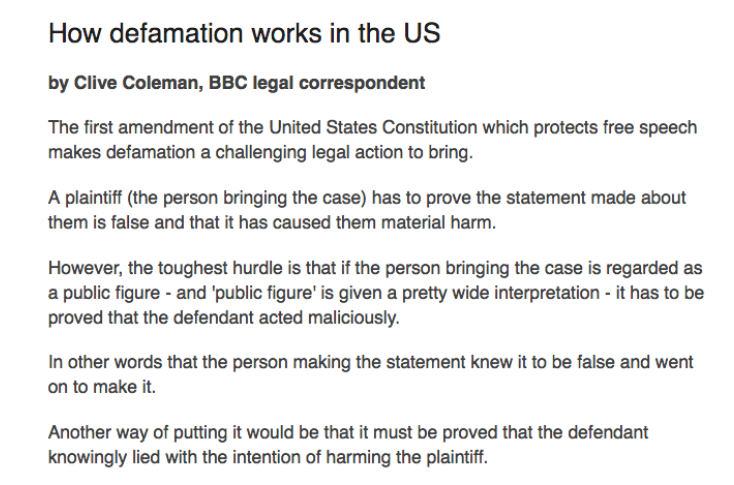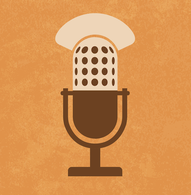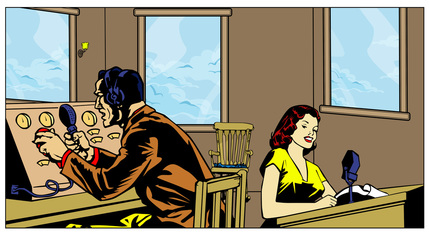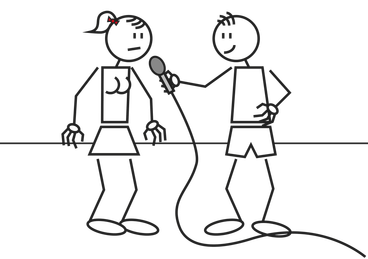|
A simulrec is a great idea. We used them all the time at the BBC World Service. Two people talk to each other via Skype or the phone. While talking via Skype/phone, both of you also record the conversation into a high-quality microphone. So, you chat through the phone/Skype, etc.; however, both of you also record into good mics at the same time. Once the interview is over, one of you sends the other person the high-quality audio WAV/AIFF file. The other person edits both quality files together. Now, you have an interview where both people have high-quality audio, and it's not crappy audio recorded through a PC microphone.
Everything you say needs to have a beginning, middle and end. And I mean EVERYTHING! In the last 18 years, I've seen soOoOOoOoOO many presenters waffle and waffle. They think they're amazing by just 'giving it;', when in fact they're just talking cow poo. And trust me, I've heard sooooo much cow poo over the last 18 years.
Before you open your gob, know EXACTLY what you're going to say. Know how you're going to start your presenter link and MORE IMPORTANTLY know how you're going to finish it. Ask yourself this: how are you going to introduce your next item? Random waffle is baaaad; prepared speech is awesome. So, do you know what you're going to say now? Ashley Talking over your guest drives me up the flipping wall, and professional broadcasters and podcasters are notoriously bad for doing this. So here’s a question for you: What is the sole purpose of your interview? Now, think about for a quick second while I go and play with some chickens.
The primary purpose of an interview is to get information from your guest across to your audience, and you can’t do that if you’re talking over the flipping answers. Gorgonzola cheese man! The interview is not about you and your big gob - NO - it’s about getting the information from your guest across to the audience. To sum up One - Ask your question and then keep your big mouth shut. Two - Listen to the flipping answers and keep your big mouth shut. Three - Don’t talk over the answers - keep your big mouth shut. And FINALLY don’t make stupid noises when your guest is replying to your questions. Right, I’m out of here because my bus leaves in 7 minutes, and I’m planning to be under it. Cheers! Ashley While studying media law is very tedious for radio DJs and podcasters, it's probably the most important thing a radio presenter has to learn. In this post, we'll learn about defamation, libel and slander. If you guide yourself by these basic rules, you'll be ok. Just to note, I'll be repeating myself throughout this blog. My goal is to drill this information into your head. You need to understand the basics of defamation. If you don't, the chances are high that you'll open your mouth, say the wrong thing and get sued. Your station can also get sued as well. Be careful! Throughout this blog, I will repeat the mantra below. "If you 'accuse' someone of something that's NOT TRUE, you could get into legal and financial trouble." Disclaimer: UK Media Law While this post deals with UK law, it’s still worth learning this information. The UK has some of the strictest libel laws in the world. If you guide yourself by UK libel laws, the chances of you being sued for defamation will be slim. I'll add a brief US law explanation at the bottom. Tip Forewarned is forearmed. The Three Terms Most Used Defamation, libel and slander. What Is Defamation? Defamation is the law's way of protecting 'reputation.' It’s merely the posh word for 'ruining someone’s credibility or ruining their reputation.' Try and think of defamation this way. It makes it easier to understand. Tip Defamation = the posh word for ruining someone's 'reputation.' Media law books define defamation as “exposing another individual to hatred, ridicule or contempt. The written statement/spoken word has caused the individual to be shunned or avoided.” The Two Forms of Defamation Defamation comes in two forms. You can 'defame' someone by either libel or by slander. Defamation = Libel and Slander Libel and slander are pretty similar. One is for the written (or broadcast) word, and one is for the spoken word (in public). However, both terms deal with affecting someone's 'reputation.' Once Again... Think of defamation (this could be libel or slander) as affecting someone's 'reputation.' Slander Slander is where I ruin your 'reputation' by the spoken word in public. Someone overhears me saying: “David is a thief, and he steals money”. The person who heard my statement now believes David is a thief. Is It True? If my statement is; however, false, I have now ruined David’s reputation. People may not do business with David because of what I've said. If what I've said has ruined David's reputation, he can now sue me for slander. If I can't prove what I said (under UK law), then I will lose the law case (and a lot of money.) Libel: This Is What Radio Presenters Need Libel is very similar to slander. Only this time, libel is where I ruin your 'reputation' by the written word or by the broadcast word. Libel incorporates websites, forums, emails, TV, and radio shows etc. (as they are a form of permanent record). Watch What You Say and Write Don't accuse anyone or any company etc. of anything you can't prove. Don't say or write anything (on social media) that can ruin the 'reputation' of a person/company etc. There have been numerous cases of people being sued for libel in the UK for tweeting 'opinions.' Example You say on your radio show: “Tracey's website is a scam”. Audience's Response Ok, we won’t do business with Tracey. Your Up and Coming Law Case Tracey now sues you for libel (the statement was made on the radio). Your comment has lowered the individual (Tracey) in the estimation of “right thinking people” (the audience or people who may do business with Tracey). Your written statement/spoken word has now affected Tracey's business, trade, office or profession. You've said... Tracey is stealing money. Don’t do business with her. Now, it's time for you to get a lawyer. Under UK law, it's down to YOU to prove your statement is TRUE in a court of law. Other Things You Can't Say Tracey is a fraud.... Tracey is a liar.... Tracey is a cheat etc. Tracey smells. This is ok. Another Example If I say, “David's business lies to its customers.” I could be sued by David if this statement is NOT TRUE. Why? Well, these words could cause David's 'reputation' harm. I'll explain again.... If David is a businessman (or business), people may not want to do business with him after hearing these words. Simply put; they may not trust him now. And if they don't trust him, then his reputation has been ruined. Remember... If your statement is NOT TRUE and affects 'reputation', you can be sued for libel. I'll say it again.... If you call someone (or a company) a thief, a fraud, a liar etc. on social media, on a website, the radio or TV etc. and you can't prove your statement, you could get sued for a lot of money. If you CAN'T prove this statement, then this = a law case. THINK BEFORE YOU STINK Before you open your mouth or tweet your comment, THINK! Will the 'statement' affect someone's 'reputation?' IF IN DOUBT, CUT IT OUT! Guests and Libel Even if you haven’t personally libelled someone, you can still get sued for what was said on your show. This is because your guest has committed libel and you’ve missed it. Tip Always monitor what your guests say as well. Defaming a Company You can defame a company too. If you say that Brand X Cola doesn’t pay their staff wages, they can sue you for ruining their reputation. Even if you change the brand name, but their brand is still identifiable by other means, you will still get sued. Social Media Technically you could also get sued for your Tweets or Facebook posts. Many people in the UK have been sued for what they've posted on social media. Watch what you post on social media. Tip Are your social media posts ruining someone’s reputation? If they are, you could get sued. Yeah but It's on the Internet.... Not everything on the internet is true. Just because someone has retweeted an allegation doesn't mean it's true. If in doubt, cut it out. The Complicated Bit and Reputation If you said Britain’s most violent criminal Charles Bronson (Google him) doesn’t pay his UK TV licence, then this is unlikely to be defamation (libel). Why is this? Well, his 'reputation' is unlikely to be ruined by this statement. He is, after all, a violent prisoner. However, if I say the head of the BBC doesn’t pay his TV licence, then this is likely to be defamation. Well, why is this? The statement against the head of the BBC will definitely affect their ‘reputation’. The BBC by law makes everyone buy a TV licence. Imagine the scandal if the head of the BBC doesn’t have a TV licence. They will sue you for damaging their reputation. And if a court of law believes that your statement has damaged their reputation, then you will be in big trouble. And it’s not just you that will be sued. Your station/publication may also be sued. Believe me; they won’t be happy about that. You may also be looking for a new job if that happens. NEVER REPEAT A LIBELLOUS ALLEGATION Anyone who repeats a libellous allegation can also be sued. This is important to understand. Example Someone on Twitter makes a comment that later on is found to be libellous. In other words, their comment has damaged the reputation of an individual or a company. As part of your radio show, you; however, have read out the libellous tweet. Not only will you be “repeating the libellous comment” (which means you could be sued) but the station that you’re representing could also be sued. Tip Repeating allegations without making sure they are true is a good way to get yourself knee deep in litigation. IF IN DOUBT, CUT IT OUT Another Tip Just because something has been written in a national newspaper or it’s online, doesn’t mean it’s always safe to use. Newspapers have got it wrong in the past and they've been sued many times. Check your sources before you make the statement. Information on the Internet Hearing or seeing something written somewhere else doesn't make it true. Just because it’s on the internet DOES NOT make it TRUE. To protect yourself is relatively easy. Don't make anything up. Check your sources and then check again. If two or more official “news agencies” (e.g. the BBC, Reuters, etc.) are covering the same story, then it’s likely to be safe. If in doubt, CUT IT OUT! Limiting Damage If your guest makes a libellous statement, you must immediately distance yourself and the station from the offending comment. Doing this straightaway will limit the potential damage. It may even result in the case not going to court if the person trusts you have acted promptly to limit the damage. What to Do When Your Guest Libels Someone If you think your guest’s comment is libellous, then immediately ask your guest to retract their comment. Something like: “I’m afraid we can’t say that on air Mr X, will you please retract that statement." Next, quickly round up the interview. We do this because we don’t want our guest to repeat their comment. Make no mention of the libellous comment and ensure that you and your station do not seem to agree with the comment. Apologize on behalf of the station (without repeating the comment) and then move on. If it's a phone in and someone says something libellous, cut them off straight away, distance yourself and the station from the comment and move on. Defences to Libel 'Justification' or in Other Words: The Truth If you can prove that the statement is true, and you have evidence which you can bring to a court of law to show that X did do Y, then you will be safe. Fair Comment The defence of fair comment allows an honest person to express an opinion even if it's “prejudiced, exaggerated or obstinate”. This can be a tricky defence so tread carefully. For example, a music review or a film review can be opinionated and negative without falling foul of the law. However... Your comment must be about a topic in the public interest. It must be based on truthful facts. It must be viewed as a comment and not as a statement of fact. If your comment seems like a statement of fact and it does affect someone's reputation, it could get you sued. So, be careful. If in doubt, cut it out. Death Another defence to libel is death. You’re OK if the person you are talking about is dead. However, check this law in your own country. Apart from that, always tread carefully. THINK FIRST before you open your mouth. It might just save you a lot of money. For more on defamation check out the BBC Editorial Guidelines online. Source: BBC: https://www.bbc.co.uk/news/world-us-canada-45551895 Ashley Cowan runs the Online Radio School where he tutors in radio presenting and media interviewing techniques. He was a BBC World Service, Radio studio manager for nine years. He was also the station manager for Radio Kings, the hospital radio station for Kings College Hospital. Other crimes include being the training manager for K2K Radio & Whitechapel AM. Sometimes he even records The Economist Audio Magazine on random Thursdays.
As a radio presenter, he's hosted radio shows on three FM stations. That was back in the day when FM radio was a big deal. The poor radio stations that had to put up with his brand of terrible comedy were: Radio DÅB, FLR 107.3 FM, and City FM. Radio DÅB had 100,000 listeners! Woo! When he's not writing about himself in the third person, then he was also a community radio DJ at Radio Kings, TGR Sound, Sydenham Radio, and Croydon Radio. He once did production work for Total Rock.com. That was a fun station with a cool owner and a great broadcast team! Brown fizzy water often accompanied the broadcasts! Critical Media Questions to Consider When Interviewing Starting Off What's the main issue here? What information do I have? What information do I still need? What are the pros about this information? What are the negatives about this information? What's interesting about this information? Force yourself to look for alternatives to the information presented. Discover The Secrets To Successful Media Interviews. Using Graphs and Pictures It's often easier to use graphics, graphs, mind maps, flow charts, etc. when representing written information. If you can, turn the written information into a visual representation. Be Objective Most of us think in a way which backs up our views; however, we need to be objective. What are your biases? Subconsciously you may lean towards certain points of view. Kill your beliefs and become neutral with the information. Do you know anyone who has an entirely different viewpoint from yourself? Talk to them about the information with regards to their point of view. E.G. you may be looking at the information from a left wing perspective. Talk to them and get a right wing perspective. They may spot things that you hadn't considered. Don't Jump to Conclusions Analyse the topic etc. from all angles. Can you trust the numbers and information being used to support this point of view? Are there assumptions being made with this information? Is the information reliable and genuine or is it based on an assumption? Are there alternatives to this information? What other things do you need to know? Take the information and come at it from an opposite point of view. Find/create counter arguments to the evidence. Don't just accept the information at face value. What Are You Taking for Granted? When researching a topic or interviewing on a subject, ask yourself "what am I taking for granted?" Is what I'm reading true? Are there persuasion techniques being used with the information/argument? Does this information/evidence use emotion instead of sound facts/information? Are you being forced to conclude a point? Should you explore different viewpoints? As you study the information, what do you need to keep in mind? Play with Different Endings Take the information and create various outcomes. Who are the main players? What are their viewpoints? How does this outcome benefit the main players? How does this outcome hinder the opposition? Analyse all outcomes. Invent different outcomes. Who's set to win with your conclusion? Who's set to lose? What effect will your conclusion have on others? Who will disagree with your conclusion? What are their main arguments against your conclusion? Do their arguments make sense? If it does, what have you missed? When creating your final argument, what was the primary information that you based your decision upon? Is that information reliable? Would new information change your final argument? Learn where to find show ideas. Discover how to show prep like a pro. Master the mixing desk. What it is, how it works and how to use it. Discover what you shouldn't do as a presenter. Ashley Cowan runs the Online Radio School where he tutors in radio presenting and media interviewing techniques. He was a BBC World Service, Radio studio manager for nine years. He was also the station manager for Radio Kings, the hospital radio station for Kings College Hospital. Other crimes include being the training manager for K2K Radio & Whitechapel AM.
As a radio presenter, he once hosted radio shows on three FM radio stations. That was back in the day when FM radio was a big deal. The poor radio stations that had to put up with his brand of terrible comedy were: Radio DÅB, FLR 107.3 FM, and City FM. When he's not writing about himself in the third person, then he was also a community radio DJ at Radio Kings, TGR Sound, Sydenham Radio, and Croydon Radio. He once did production work for Total Rock.com. That was a fun station with a cool owner and a great broadcast team! Brown fizzy water often accompanied the broadcasts! He's London Irish (so he likes a beer) and he also teaches guitar. He's recently created an online Fingerpicking for Guitar course. There he teaches the art of fingerpicking for erm...guitar. Students can learn twenty different fingerpicking styles for their chords. |
Ashley..
is an ex BBC, radio studio manager, and the ex manager of Radio Kings, the hospital radio station for King's College Hospital. He's presented on three FM stations and waaay too many community stations. Archives
May 2020
Categories
All
|





 RSS Feed
RSS Feed

